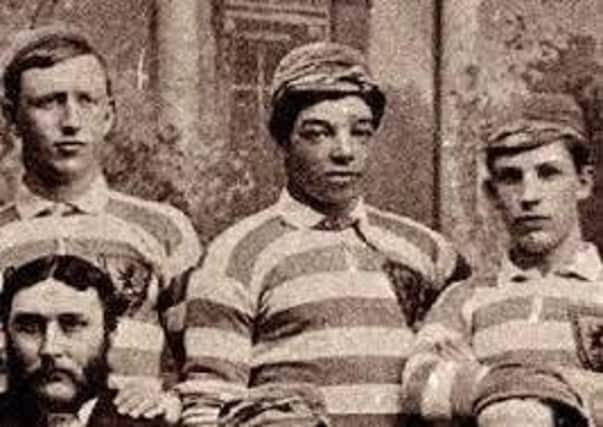Andrew Watson: Scotland remembers first black footballer 100 years on from his death


In 1875, the name Andrew Watson was well known to Scottish football fans. Son of Scottish sugar planter Peter Miller Watson, he was born on 24 May 1856 in Demerara, British Guiana and grew up to become the first black footballer to represent the Scottish national team.
Now, exactly 100 years after his death, he is set to be honoured with the release of a brand new book on his life, accompanied by an online event to celebrate his life and even a commemorative pin badge, while there’s also a GoFundMe page that aims to raise money for a a memorial in Scotland
Advertisement
Hide AdAdvertisement
Hide AdOne of the most talented players of his generation, Watson is a hugely prominent figure in Scotland’s history, a player who transcended above any racial discrimination, he was once named as Scotland’s greatest ever left back by sportswriter J. A. H. Catton in 1926.
However, despite his huge significance in Scottish football, much of what had happened to Watson after his retirement was left unknown for decades after his passing.
Thankfully, this all changed when football historian Andy Mitchell went in search of answers as to Watson’s whereabouts in 2013.
"He was such a key figure in Scottish football that it was extraordinary nobody knew what happened to him. It was thought he had died in India or Australia, however, after a lot of research I managed to find his grave much closer to home” he said.
And, much to Mr Mitchell’s surprise, he found the grave situated in a small cemetery in the leafy suburbs of south-west of London.
Secluded and surrounded by grass, the discovery of Watson’s grave “opened the door to many more discoveries” about Watson’s life.
Furthermore, the historian is “delighted” that the iconic footballer’s grave is about to be restored after a successful crowdfunding campaign achieved its target of £2,000 in just two weeks.
A pioneer of Scottish football, Watson would first move to England with his father and siblings when he was aged just five, where he would remain until sadly, in 1869, his father would pass away.
Advertisement
Hide AdAdvertisement
Hide AdFollowing his death, Watson was set up with an annuity of £6,000 that provided for his education and an income. This allowed Watson, aged 19, to go to the University of Glasgow to study engineering, natural philosophy and mathematics - though he left after just four weeks, allegedly to pursue a career in football.
With his reputation growing, the full back would go on to play – and be secretary of - Queens Park, one of the country's most successful amateur clubs. He would win the Scottish Cup with Queens Park, where he caught the eye of the Scotland bosses.
His rise in reputation would eventually lead him to international recognition, where he famously went on to captain the national side, making his debut in the team that demolished fierce rivals England on their own turf, with Scotland thrashing the ‘Auld Enemy’ 6-1 at The Oval – a result that still stands as England’s biggest ever home loss. His third and final cap – a 5-1 win over England at first Hampden – is now immortalised in the form of a mural that can be seen in the Southside of Glasgow.
Llew Walker, chairperson of one of Watson’s former clubs Corinthians Casuals FC, was so taken by player’s story, he decided to write a book on Watson’s life, titled Andrew Watson, a Straggling Life: The Story of the World's First Black International Footballer.
"The more I researched, the more I realised his story had not been fully explored,” says Mr Walker.
"I was interested in Watson's time at Corinthians, and I planned to write an article for the club's website or something similar. Instead of looking at the three seasons he played at the club, I ended up tracing a life story" said Walker.
And, despite a growing recognition of Watson’s achievements in Scotland, Mr Walker admitted he is “always disappointed at how little he is known south of the border.”
"That second thumping of England forced the English FA to look at ways of levelling the playing field.
Advertisement
Hide AdAdvertisement
Hide Ad“Understanding that Queen's Park had consistently provided the Scottish team with most of its players, the English FA decided to create a team in the Queen's Park mould, which yielded the birth of Corinthians” commented the author.
He added: “I think many consider him a Scottish phenomenon, forgetting he was brought up at respectable English Schools, spoke with an impeccable English accent and lived in England for most of his life. He played for Surrey County, was selected to play for a London and a South of England representative team too, and without his influence, the English game, may not have evolved as it did. This makes Watson extraordinary and an important figure in the history of football.”
“There is a misconception that the history of football is a white, English invention” he said, but the beauty in Watson’s story is that “as a Black Scotsman, he is proof that football was played and enjoyed by everyone.”
A message from the Editor:
Thank you for reading this article. We're more reliant on your support than ever as the shift in consumer habits brought about by coronavirus impacts our advertisers.
If you haven't already, please consider supporting our trusted, fact-checked journalism by taking out a digital subscription.
Comments
Want to join the conversation? Please or to comment on this article.